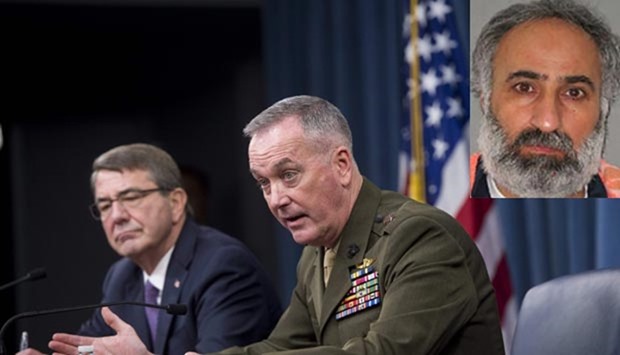US forces killed the Islamic State's second-in-command this week, dealing a blow to the extremist group's ability to conduct operations in Iraq, Syria and abroad, Pentagon chief Ashton Carter said on Friday.
"We are systematically eliminating ISIL's cabinet," Carter told reporters, referring also to the killing early in the month of Omar al-Shishani, the man known as "Omar the Chechen," who was effectively IS's defence minister.
The latest killing "will hamper the ability for them to conduct operations inside and outside of Iraq and Syria," Carter said of Abd ar-Rahman Mustafa al-Qaduli, referring to him as Haji Imam. He said al-Qaduli served as IS finance minister and had been behind some foreign plots.
"The momentum of this campaign is now clearly on our side."
Carter declined to say whether al-Qaduli had been killed by a drone strike or in a bombing raid involving manned aircraft; nor would he specify whether the attack occurred in Syria or Iraq, though he said that any action in Iraq would only have been taken with Iraqi government approval.
The US Justice Department had offered a bounty of up to $7mn for information leading to al-Qaduli.
"A few months ago when I said we were going to go after ISIL's financial infrastructure, we started with storage sites, and now we've taken out the leader who oversees their finances, hurting their ability to pay and hire recruits," Carter said, using an alternate acronym for the group.
"Our campaign plan is first and foremost to collapse ISIL's parent tumor in Iraq and Syria."
Carter was asked whether al-Qaduli could have had a link to the November terror attacks in Paris or to this week's bombings in Belgium and said he could not confirm a specific link to the Brussels attacks.
But whether IS militants in Iraq and Syria like al-Qaduli had specifically directed such attacks or were their motivating inspiration, the US-led forces would do their best to eliminate them, Carter said.
Al-Qaduli was born in the Iraqi city of Mosul, according to Iraqi security sources. He was in Afghanistan in the late 1990s.
He joined al-Qaeda in 2004, and became a deputy to the feared Qaeda chief in Iraq, Abu Mussab al-Zarqawi, who was killed in 2006 by an American drone strike.
Al-Qaduli was captured and imprisoned, but rejoined the Islamic State group in Syria after he was freed in 2012.

